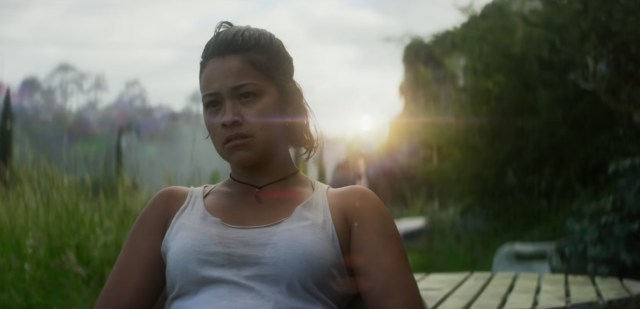In Annihilation, a biologist, psychologist, physicist, anthropologist, and paramedic enter the shimmer — a mysterious and expanding sector marked by increasingly unnerving mutations. The shimmer is full of contradictions, beauty and terror coexisting. Rainbow light touches down on snarled branches. A rainbow beach and its crystalline trees would be enchanting if not for the presence of human bones, arranged as if an intentional warning. The multicolored flowers that spackle the shimmer’s landscapes become more horrifying once they coexist with fragmented human remains.
The shimmer distorts the team’s memory. Days become months. It’s dreamlike, but it quickly gives way to nightmarish gore. Blood is as essential to Annihilation’s visual storytelling as mutation. Writer-director Alex Garland uses glasses of water and rainbows to play with the concept of refraction. He also uses blood to disturb without doing so gratuitously. The blood’s also there to remind us that the shimmer is fucking with humanity on a cellular level, a violent overwriting of bodies and minds.
The movie itself goes through various mutations. Gentle acoustic music scores the first stretch, sounding more like the soundtrack for a road trip scene in an indie rom com than for a sci-fi horror movie. In the movie’s final act, the music strikingly shifts to a haunting original score that has stuck with me long after I left the theater, the slicing synths as unshakeable as some of the movie’s bloodiest scenes. What starts as a fairly straightforward sci-fi horror hybrid gradually becomes something much weirder. There’s a long, indelible scene near the end that is one of the weirdest film sequences I’ve ever seen.

excuse? me?
Natalie Portman is magnetic as the film’s protagonist. Jennifer Jason Leigh’s very recognizable delivery adds to the foreboding tone that looms over the shimmer. Tessa Thompson gives a much different — but still great — performance than her usual, playing a character that’s more timid and uncertain than her other recent roles. Tuva Novotny is subtle, but her characterization of stifled fear is affecting.
And then Gina Rodriguez steals the show with a standout performance. And no I don’t just say that because she plays a confident and muscly soft butch lesbian with an undercut who opens a beer bottle in that way where you slam it against a table edge with your hand (something I have never been able to accomplish without hurting myself). But yes, those details are also important!!!! Also, to set the record straight: Thompson’s Josie and Rodriguez’s Anya are not dating in the movie, although there are some gentle touches and Anya appears particularly protective of Josie.
As she has proven over and over in her roles as Jane Villanueva on Jane The Virgin, Rodriguez does many things at once in her performance in Annihilation, which has a distinct mutation of its own that I won’t get too specific about so as not to spoil. She’s funny, delivering some of the movie’s rare but needed bursts of comedic relief. But she also encompasses the emotional complexity of what it really means to enter the shimmer. She starts with a lot of swagger that, like the shimmer itself, suddenly and disorientingly becomes something much more insidious. Rodriguez flips that switch in a wholly convincing way. Her character’s confusion and paranoia instantly pulls you right into that dark, uncertain place.

just gals protecting pals
I hope this is the role that propels Rodriguez into a movie star trajectory for her career. She has huge action star potential that I’m extremely ready for. And she should also be contractually obligated to have an undercut for all future roles thankyouverymuch.
Along those lines, I can’t — and don’t want to — write about this movie without addressing its whitewashing problem, a serious issue that should not be downplayed. In the book trilogy that the movie is adapted from, Portman’s character is supposed to be Asian, and Leigh’s character is supposed to be half-Indian. These details are not specified until the second book and apparently Garland wrote his adaption of the first book before the second was released.
Garland and Portman have both made decent statements about the issue, but providing excuses and explanations for the casting does downplay the larger issue of erasure in Hollywood at large and particularly within the action and sci-fi genres. Yes, there are two women of color in Annihilation’s core cast, but touting that in the face of whitewashing criticisms also reduces them to tokens. Why couldn’t the lead character of this movie be a woman of color, too? The fact of the matter is that when race is unspecified, as is the case in the first Annihilation book, Hollywood still has an overwhelming instinct to default to white. And I can’t help but think about how I would have felt—as a half-Indian lover of sci-fi horror—had Dr. Vettris been cast in accordance with her identity in the books.
Annihilation can be both a great, women-centric sci-fi horror movie and also a flawed one much like Black Panther can be the best goddamn superhero movie ever and still have a problem with (Black) queer erasure, a paradox Autostraddle’s Carmen Phillips tackles beautifully in her review. To ignore these kinds of criticisms is to let these problems persist.



CONTRACTUALLY OBLIGATE HER TO HAVE THAT UNDERCUT YES.
I loved, loved, loved the books and was very unsure about the film, however I was *not* unsure about Gina’s cast omg.
I also loved the books! I’m planning to reread them soon.
I’m sooo unsure about seeing the movie, though. The trailer didn’t sell me, and reactions have been so all over the place. But also apparently some parts are super beautiful? This review makes me more interested than I was before. Indecision…
Have you seen it yet? I you have, what did you think of it? If not, its available on Netflix. I plan to watch it, if I can get the time…
I am kind of excited to see this, even though I have mixed feelings on the Southern Reach Trilogy. I liked it overall, but honestly would have been happy with some of the meanderings being cut and seeing them combined into two books instead of 3. The whole concept was suitably creepy though.
The whitewashing thing is a weird one for me. I totally get it, but I read all three books and honestly hadn’t realized they gave any ethnicity for the Psychologist or the Biologist. I knew Control and Grace were both people of color because the book specifically talked about it, but I had to go back and re-read the part about the Biologist because I clearly missed it the first time. Same with the Psychologist.
IIRC, the author was also very involved in the adaptation. So while it’s all sorts of messy, I do wonder if the author bothered to tell anyone prior to casting that he was assigning ethnicity to the Biologist and Psychologist; if not, it’s really hard to blame the director for whitewashing if it wasn’t spelled out in the book he adapted and the author didn’t tell him about what went on in the other books…which weren’t being adapted. So I would put at least some blame on the author if he just threw in a random ethnicity for description and didn’t think anyone would notice or care if it changed.
Also, I think the bigger change is giving the characters actual names-in the series, you don’t learn the Psychologist’s name until the 3rd book I believe, and you never learn the Biologist or her husband’s name, or the names/backgrounds/anything beyond gender and job of the rest of the expedition.
It changes in the last book in particular, but in the first book and most of the second book the characters mostly exist as a vehicle to move the mystery and general horror sense forwards-they aren’t developed characters with a rich history, they’re just ciphers and stand-ins to flesh out the larger crazy. So I think you could make a strong argument for saying that they should have stuck with the described ethnicities in the later books, but you could also argue that if he was just working off the first book, Garland was handed a completely blank slate, with a story that just barely elevated the characters above “stock character A is married to stock character B”.
So, I went to see this yesterday because even though I know I’m not a big fan of this genre of film, the promise of Tessa Thompson (especially after reading Carmen’s piece) and a lesbian Gina Rodriguez was just too much goodness for me to ignore.
After I left the theater, my sister asked me if I liked the movie and, with uncertainty resonating in my voice (and on my face, I’d imagine), I responded, “I don’t think so?” I’m not sure I’ve ever not liked a movie AND also wanted rush right out and see it again. It was a weird reaction…like maybe I’d been inside the shimmer.
A few additional thoughts:
1. The score to this movie and the cinematography are both so beautiful, evocative and haunting…I think they’re a large part of why I really want to see it again.
2. Nine times out of 10 when I read a director and/or actors’ excuses for whitewashing, I think they’re total bullshit but, in this case, I’m actually inclined to believe Peter Garland. The world he creates in Annihilation, outside these female leads, actually looks like the world…which is not a given in Hollywood. I can’t imagine someone being so intentional about that and so capricious about this other issue.
3. Gina Rodriguez really is great in this movie…as someone who loves her on Jane the Virgin, I was worried about coming into this movie and seeing Jane Villanueva walk around with a gun, but I didn’t. It’s the physical part of her performance–the haircut, the bulkier, muscular appearance, the swagger–that really helped me see Gina as her character.
I’m interested in not only seeing where this takes Rodriguez’ film career but seeing how intentional she continues to be in separating herself from the wholesome character that’s made her famous.
If it helps, I have the same “kind of?” response to whether or not I liked the trilogy, it’s just that kind of material!
I really loved Ex Machina so when I heard that the same director was doing this movie with Gina Rodriguez and Tessa Thompson I was super excited. And while the whole cast was great, especially Gina, I also don’t think that I really liked it? I think the idea was good but I didn’t love the execution? Especially the ending? It felt like they tried to an ending like “The One I Love” but it just didn’t work for me in this film like it worked in the former.
I went to the movie because Tessa Thompson and Gina Rodriguez were in it, and I mostly got reminded about how I’m not a fan of horror!! I didn’t necesarily enjoy the movie, but I did enjoy seeing Gina in a tank top and gal palling with Tessa, and that was worth it for me! I did really enjoy how pretty it was!
I did not know about the casting issue until after the fact and it’s disappointing.
This article is very helpful and interesting too
슬롯사이트
Thank you for providing a good quality article
온라인바카라
Natalie is Israeli Jewish, but I guess that’s still too white. This Year’s Academy Awards and Golden Globes had a huge ratio of women and men who weren’t white, but the minute a white person won an award, there was criticism. I’m sorry, but Angela did not deserve the best actress award. However, I can’t tell you how many people complained about it. The best part was when one woman I work with complained about it and then admitted that she never saw the movie.